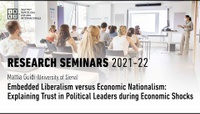Research Seminar | Embedded Liberalism versus Economic Nationalism: Explaining Trust in Political Leaders during Economic Shocks
Mattia Guidi (University of Siena). Chair: Yannis Karagiannis (IBEI)
Available in video:
Globalization is increasingly contested in advanced economies, as it seems to bring about benefits that are concentrated in the hands of a few firms and people, while most businesses and citizens bear the cost of global competition. One of the potential costs of globalization, caused by increasingly flexible value chains and capital mobility, is the risk that firms that produce and employ workers in a country will relocate their production elsewhere. The key aim of the study is to better understand the factors driving the political preferences of individuals in the face of a negative economic shock of this kind. Western political parties have provided two broad sets of answers to the concerns of individuals exposed to globalization-induced economic shocks. On the one hand, parties can embrace the embedded liberalism paradigm: promoting redistribution via higher taxation as a means for shielding individuals from the negative consequences of market opening. On the other, political parties that have advanced, as an alternative, the economic nationalism paradigm can propose to cope with potential negative economic shocks induced by globalization by implementing policies of closure for both products and people, accompanied by a promise of lower taxation. We test which paradigm inspires more trust in voters facing a globalization-induced economic shock with a survey experiment administered in France, Italy and Germany. The results show that neither paradigm prevails, but voters tend to prefer that a negative economic shock is dealt with by a politician that has implemented a redistributive fiscal policy.
Mattia Guidi is an associate professor of political science at the Department of Social, Political and Cognitive Sciences of the University of Siena. Previously, he has been assistant professor at Scuola Normale Superiore (2017-19), post-doctoral fellow at the Department of Political Sciences of LUISS Guido Carli, Rome (2013-17), and post-doctoral fellow at Collegio Carlo Alberto, Turin (2012-13). Mattia Guidi holds a Ph.D in Political and Social Sciences from the European University Institute (2012). His research interests include the study of delegation and institutions, independent regulatory agencies, macro-economic governance of the European Union, EU competition policy. He has taught courses in European Public Policies, International Public Policies, Public Policy and Regulation in the EU, Quantitative Methods for Social Sciences, Political Communication. He has published on international journals such as International Organization, Socio-Economic Review, JCMS: Journal of Common Market Studies, Regulation & Governance, Governance, Europe
an Union Politics, European Political Science Review, Acta Politica, Comparative European Politics, and book chapters for the publishers Palgrave MacMillan and Routledge. He has published two monographs, “Competition Policy Enforcement in EU Member States” (2016, Palgrave MacMillan) and “The Law and Politics of Global Competition” (2022, Oxford University Press), with Christopher Townley and Mariana Tavares.
|
*This activity has limited capacity. Registration is required to have a guaranteed seat and be able to attend the face-to-face modality. Virtual attendees will receive the access link by email.
|


